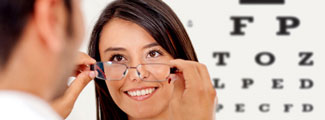Primary Care
Regular eye exams are an important tool in maintaining eye health. Early detection of eye disease allows for better choices of treatment options and a reduced risk of permanent vision loss.
The Exam
 Lack of symptoms is a poor technique for gauging eye health. Regular eye exams for adults and children are designed to prevent vision loss or poor visual development, respectively. The so called “eye-glass” exams are a part of, and not equal to, a properly conducted comprehensive eye exam. The latter enables us to detect many chronic ocular and medical conditions, early detection of which can lead to more effective treatments.
Lack of symptoms is a poor technique for gauging eye health. Regular eye exams for adults and children are designed to prevent vision loss or poor visual development, respectively. The so called “eye-glass” exams are a part of, and not equal to, a properly conducted comprehensive eye exam. The latter enables us to detect many chronic ocular and medical conditions, early detection of which can lead to more effective treatments.
The Comprehensive Eye Examination
The most common eye conditions diagnosed during a comprehensive eye exam are called refractive errors that cause blurry vision. These conditions affect millions of people in the United States and often worsen with age. Fortunately, refractive errors can be treated with eyewear, contact lenses, or surgery to let patients enjoy clear vision at all distances. An eye exam is different from a vision screening, which only tests vision and is commonly performed by a school nurse, pediatrician or other health care providers. Only an eye specialist can perform a comprehensive eye exam to evaluate the overall health of the eye.
During a routine eye exam, the doctor will evaluate the eyes for conditions such as:
- Refractive errors
- Retinal problems e.g., macular degeneration and diabetes
- Eye movement disorders
- Developmental problems
- Cataract
- Dry Eye Syndrome and excessive tearing
- Glaucoma
- Lid problems
- Floaters
- Medical conditions that cause eye problems e.g.
arthritis, lupus, sickle cell, diabetes, high blood pressure, MS
This is done through a series of direct exam and diagnostic tests, performed in the office:
- Refraction (determination of refractive error)
- Visual field testing
- Eye exam with the microscope
- Dilation of pupils with drops
- Glaucoma testing
- Wave-front aberrometry
- Corneal topography
- Optical tomography
- Photography of the Optic nerve and Retina
Treatment After a Comprehensive Eye Examination
After completing the comprehensive exam and reaching an accurate diagnosis, the doctor will develop a treatment plan which can include:
- Observation
- A prescription for eyewear or contact lenses
- Medication
- Laser Treatment
- Surgery
TO LEARN MORE ABOUT OUR OPHTHALMOLOGY SERVICES, PLEASE CONTACT US AT 407.896.8990 TODAY TO SCHEDULE AN APPOINTMENT.
